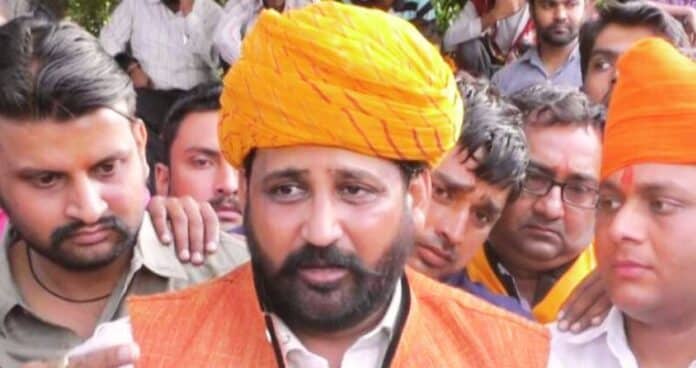A horrific video has gone viral online showing brutal murder of the Karni Sena chief Sukhdev Singh Gogamedi. Gogamedi, the leader of the Hindu right-wing organization Shri Rashtriya Rajput Karni Sena (SRRKS), was fatally shot by armed individuals at his residence in Jaipur, as seen in the video. Additional reports suggested that perpetrators had shared tea with Gogamedi before executing the fatal attack. They allegedly sat with him for over 10 minutes before suddenly opening fire, catching the victim off guard.
Gogamedi sustained at least five close-range gunshot wounds, with the final bullet directed at his head. The footage further showcased one of Gogamedi’s guards attempting to intervene, only to become a target of the assailants who fired additional shots in his direction. The 20-second clip vividly portrayed the gunmen persistently firing at Gogamedi even after he was dead.
The shocking incident has since sparked intense protests among the Rajput community throughout the state of Rajasthan. Viewers’ discretion is strongly advised for watching the following video.
Who is Responsible for the Assassination of Karni Sena Chief?
The assassination of Karni Sena chief remains a complex and unsolved mystery, shrouded in a web of conflicting narratives and murky alliances. While a finger of suspicion points toward the notorious Lawrence Bishnoi gang, whose member claimed responsibility on social media, the true picture is far from clear.
The Bishnoi gang’s history of violence, coupled with reports of a land dispute between them and Sukhdev, paints a compelling picture of motive and opportunity. However, Sukhdev’s leadership of the Karni Sena, embroiled in numerous controversies and disputes, also presents a potential avenue for animosity and revenge.
The notorious criminal organization led by Bishnoi has asserted accountability for numerous prominent homicides across Delhi, Haryana, and Rajasthan, notable among them being the killing of Punjabi singer Sidhu Moosewala in 2022 and the gangster Raje Theth. Bishnoi, who has been incarcerated since 2014, has also been accused of orchestrating the murder of Bollywood actor Salman Khan. The gang’s brazen involvement in high-profile killings has raised concerns and intensified efforts by law enforcement agencies to curb their criminal activities.
Adding fuel to the fire are questions surrounding the police’s role. Reports of a disregarded request for security raise disturbing questions about their understanding of the threat and their commitment to protecting individuals at risk. This negligence not only adds another layer of ambiguity to the case but also fuels public outrage and erodes trust in law enforcement.
But the assassination cannot be viewed in isolation. It occurred amidst a volatile environment of rising tensions and simmering conflicts, both political and social. Historical grievances, political rivalries, and social inequalities contribute significantly to this volatile landscape, potentially providing fertile ground for violence and extremism.
Torn Between Ideology and Power
Sukhdev Gogamedi was a complex figure who stood at the crossroads of ideology and power. His journey within the Rajput Karni Sena, a right-wing organization, was marked by both dedication and dissent, ultimately leading him to carve his own path. Gogamedi initially joined the Rajput Karni Sena, led by the charismatic Lokendra Singh Kalvi. He played a significant role in the organization’s highly visible protests against the Bollywood film “Padmaavat,” which they deemed historically inaccurate and offensive to Rajput pride. His dedication and activism within the Sena earned him recognition and influence.
However, over time, tensions arose between Gogamedi and Kalvi. In 2015, Gogamedi severed ties with the Rajput Karni Sena and established his own organization, the Shri Rashtriya Rajput Karni Sena (SRRKS). This decision marked a significant turning point in his life, setting him on a course independent of Kalvi and the original Sena.
While both organizations shared the core ideology of safeguarding Rajput interests and promoting their cultural heritage, their approaches and internal dynamics differed significantly. Gogamedi’s SRRKS likely aimed to address the points of contention he had with the original Sena, potentially focusing on different strategies or emphasizing specific aspects of the Rajput narrative.
Gogamedi’s split from the Rajput Karni Sena had a significant impact on the organization’s landscape. It created a new power dynamic, potentially weakening the original Sena’s influence and leading to competition for resources and support within the Rajput community. Moreover, it offered a space for alternative voices and perspectives within the larger Rajput movement.
However, the split also contributed to internal divisions within the Rajput community. The existence of two separate organizations with similar goals could potentially lead to confusion, competition, and even conflict.
Rajput Community Demands Justice
Supporters of Gogamedi and members of the Rajput community swiftly gathered at his residence, obstructing main roads and vehemently calling for the apprehension of the assailants. The fervor escalated into widespread unrest across the state, with protests erupting in Alwar, Jaisalmer, Jodhpur, and Rajsamand.
In Sadulpur city, Churu, Gogamedi’s supporters resorted to pelting stones at a Hanumangarh-bound Rajasthan Roadways bus, carrying 25 passengers. Simultaneously, another agitated mob blocked a road at Nangli Circle in Alwar, issuing a demand for the perpetrators to be dealt with within 48 hours. In Jaisalmer and Taranagar, protesters set tires ablaze at bus stops and major intersections.
Mahipal Singh Makrana, the chief of Shri Rajput Karni Sena, addressed the agitated demonstrators in Jaipur, issuing a stern threat to disrupt the forthcoming oath-taking ceremony of the new Rajasthan chief minister if the culprits were not swiftly brought to justice.
Against the backdrop of this turmoil, a political storm unfolded in Rajasthan, where the Bharatiya Janata Party (BJP) recently secured victory, displacing the incumbent Congress government. Union Minister and BJP MP from Jodhpur, Gajendra Singh Shekhawat, highlighted the prevalence of “gang wars” during the Congress’s rule, pledging to prioritize efforts to make the state crime-free under the new BJP government. In response, the Congress asserted that the BJP’s triumph had “emboldened criminals,” with senior leader Pramod Tewari emphasizing the prompt apprehension of culprits under the Congress regime.


